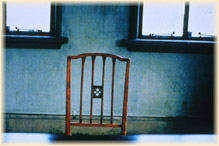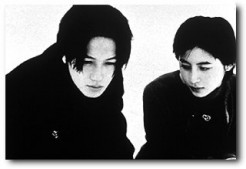After Life
aka Wandafuru raifu
|
| |
 |
Japanese
language. Japan, 1998. Not rated. 118 minutes.
Cast: Arata, Erika Oda, Susumu
Terajima, Takashi Naitô, Kei Tani, Toru Yuri, Hisako Hara, Taketoshi
Naitô
Writer: Horokazu Kore-eda
Music: Yashurio Kasamatsu
Cinematographers: Masayoshi Sukita, Yutaka Yamazaki
Producers: Masayuki Akieda, Shiho Sato
Director: Horokazu Kore-eda
|
| Grade:
A |
Review
by Jeff Vorndam |
 irokazu
Kore-eda's After Life is one of the best films I've seen this
year. Your enjoyment may depend somewhat on whether you find the premise as
fascinating as I do. In the film, a group of 22 recently deceased people arrive
at a way-station to eternity that resembles an old schoolhouse or goverment
building. They are informed that over the course of the week they must select
one special memory from their lives to spend their eternity in. For example,
if someone chose a moment relaxing on a beach at age fifteen, they would be
in that moment forever. It's an Eastern concept that I think a lot of Western
viewers might consider condemnatory. We like to think variety is preferable
to the same thing over and over again. However, Kore-eda convinced me by the
end of the film of the perfection of the idea.
irokazu
Kore-eda's After Life is one of the best films I've seen this
year. Your enjoyment may depend somewhat on whether you find the premise as
fascinating as I do. In the film, a group of 22 recently deceased people arrive
at a way-station to eternity that resembles an old schoolhouse or goverment
building. They are informed that over the course of the week they must select
one special memory from their lives to spend their eternity in. For example,
if someone chose a moment relaxing on a beach at age fifteen, they would be
in that moment forever. It's an Eastern concept that I think a lot of Western
viewers might consider condemnatory. We like to think variety is preferable
to the same thing over and over again. However, Kore-eda convinced me by the
end of the film of the perfection of the idea.
Many of the actors playing the recently demised are non-professionals. Kore-eda
has a background in documentary film, and he started this film by interviewing
several people and posing them the question of which memory they would take
with them. He came to realize that the authentic and idiosyncratic responses
he was getting were more interesting than the scripted ones he had for his professional
actors, so he incorporated them in the film. Much of the first half of the movie
is in the style of a documentary/interview--shot in handheld 16mm, with little
more than a talking head.  The
memories that are being described are so evocative that I didn't need to have
cutaways to embellish them. The interviewers are presented initially as just
doing their job. They talk amongst each other between interviews, and strategize
on how to get their "clients" to select their best memories. Gradually, we learn
more about these workers, who are deceased themselves, and why they are here.
The
memories that are being described are so evocative that I didn't need to have
cutaways to embellish them. The interviewers are presented initially as just
doing their job. They talk amongst each other between interviews, and strategize
on how to get their "clients" to select their best memories. Gradually, we learn
more about these workers, who are deceased themselves, and why they are here.
Once a memory has been selected, the interview team reconstructs the memory
on film and upon viewing the film the person whose memory is being shown
is transported into their afterlife within that reality. Problems arise when
one seventy-year man can't find any memory worthwhile to mention. He's led an
ordinary unremarkable life, he says. Another man, aged 21, pointedly won't
select a memory because he feels that not doing so gives him responsibility
for his own life. Eventually, the interview team has the 70 year old (Watanabe-san)
view his life on tape--to jog his memory. A very funny scene occurs where he
sees himself fumbling for words on a first date with his future wife, and he
calls his younger self an "idiot." [Note: The following may be a minor
spoiler:] When he does eventually select his memory, the freeze-frame
instance was very moving to me and was when I came over Kore-eda's side
that one memory could be beautiful enough to distill one's life and be worthy
of living in forever. [End spoiler]
AboutFilm.Com
The Big Picture
|
| Carlo |
B+
|
| Alison |
B+
|
| Kris |
-
|
| Jen |
-
|
| Dana |
A
|
| Jeff |
A
|
The film is essentially about memory and its importance in our lives. Kore-eda
was inspired to make the film when his father contracted Alzheimer's disease
and was no longer able to recognize his son. There is a wealth of ideas relating
to memory that are explored. For example, how much of what we recollect is even
true or have we internally idealized it? Especially with the older memories
of ours, are they authentic or do we mentally fill in gaps from what pictures,
relatives, and home videos tell us? It's important that the movie makes a point
that the interviewers recreate the memories on film. For most personal
filmmakers, their movies are physical representations of their memories and
experiences. In some ways, we go to movies to see films that remind us of our
own past experiences.
I found After Life to be a very sweet and positive film. One woman's
favorite memory of a red dress her brother gave her as a child, and the "Red
Shoes" dance she performed in it was told in such childlike earnestness and
enthusiasm that I couldn't help but smile for her when she had her experience
recreated. The recreation scenes are filmed in 35mm so that they are more vivid
than the rest of the film and it speaks to the pungence of the memories that
we hold dearest. Like our most cherised memories, After Life is warm
and intimate, and I will remember it fondly when the "year's best" lists are
compiled.
Review © July
1999 by AboutFilm.Com and the author.
Images © 1998
Artistic License Films. All Rights Reserved.

![]() irokazu
Kore-eda's After Life is one of the best films I've seen this
year. Your enjoyment may depend somewhat on whether you find the premise as
fascinating as I do. In the film, a group of 22 recently deceased people arrive
at a way-station to eternity that resembles an old schoolhouse or goverment
building. They are informed that over the course of the week they must select
one special memory from their lives to spend their eternity in. For example,
if someone chose a moment relaxing on a beach at age fifteen, they would be
in that moment forever. It's an Eastern concept that I think a lot of Western
viewers might consider condemnatory. We like to think variety is preferable
to the same thing over and over again. However, Kore-eda convinced me by the
end of the film of the perfection of the idea.
irokazu
Kore-eda's After Life is one of the best films I've seen this
year. Your enjoyment may depend somewhat on whether you find the premise as
fascinating as I do. In the film, a group of 22 recently deceased people arrive
at a way-station to eternity that resembles an old schoolhouse or goverment
building. They are informed that over the course of the week they must select
one special memory from their lives to spend their eternity in. For example,
if someone chose a moment relaxing on a beach at age fifteen, they would be
in that moment forever. It's an Eastern concept that I think a lot of Western
viewers might consider condemnatory. We like to think variety is preferable
to the same thing over and over again. However, Kore-eda convinced me by the
end of the film of the perfection of the idea.  The
memories that are being described are so evocative that I didn't need to have
cutaways to embellish them. The interviewers are presented initially as just
doing their job. They talk amongst each other between interviews, and strategize
on how to get their "clients" to select their best memories. Gradually, we learn
more about these workers, who are deceased themselves, and why they are here.
The
memories that are being described are so evocative that I didn't need to have
cutaways to embellish them. The interviewers are presented initially as just
doing their job. They talk amongst each other between interviews, and strategize
on how to get their "clients" to select their best memories. Gradually, we learn
more about these workers, who are deceased themselves, and why they are here.
